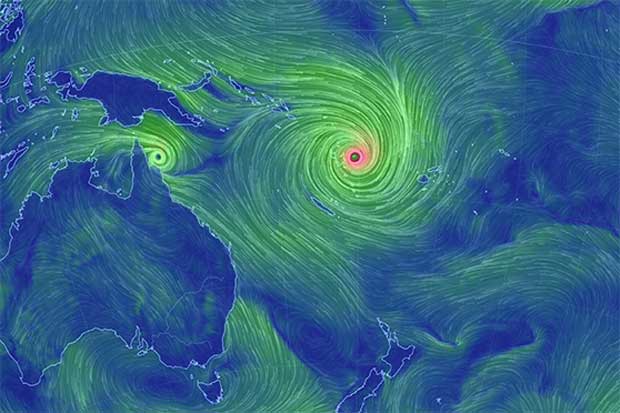What are we to make of the gargantuan elephant in the ABC studio that failed to get a mention?
Despite breathing down the neck of ABC’s 7.30 anchor, Leigh Sales on Monday night, no reference was made to it during an interview with Joe Natuman, Prime Minister of cyclone ravaged Pacific Island nation, Vanuatu.
Perhaps Sales was being sensitive to the Prime Minister’s distressed state. He had, after all, experienced firsthand a category 5 cyclone and had seen his nation turned into rubble, with the death toll still rising.
The Prime Minister said that the last time his country was devastated by a cyclone was during the 1980s, but that was a modest category three system.
The nature and scale of the destruction wrought by Cyclone Pam, packing winds of over 250 kilometres per hour and waves several metres high, was in his words, unprecedented.
Despite the unusual ferocity of this event, Sales studiously avoided the unmentionable – anthropogenic climate change. Instead, the questions dealt with the emergency response, food and shelter requirements and the aid sought from and provided by Australia.
Sales was not alone in her reluctance to bring up the matter of human-induced climate change. Despite widespread and heartfelt declarations of support and sympathy there appeared to be an unspoken media censorship on this issue.
It was as if the very mention of the term was considered insensitive; too politically tainted; and not part of objective and impartial reportage.
Yet politicians in Vanuatu are considerably less reticent, mindful of the fact that Australia is one of the highest per capita carbon emitters in the world and that our Prime Minister, Tony Abbott, is not only a climate sceptic (once describing the science of climate change as “absolute crap”), and more recently insisting that “coal is good for humanity”.

Perhaps our Prime Minister would like to run this latter proposition by the people of Vanuatu? He needs to be cautious though. As Cyclone Pam was bearing down on the tiny Pacific island nation – which has one of the smallest carbon footprints in the world – their President, Baldwin Lonsdale, was at conference in Japan focussed on disaster risk reduction.
Lonsdale told delegates that: “We see the level of sea rise… The cyclone seasons, the warm, the rain, all this is affected… This year we have more than in any year… Yes, climate change is contributing to this.”
Hearing news of unfolding events back home, Lonsdale remarked, “I am very emotional… Everyone has that same feeling. We don’t know what happened to our families… We cannot reach our families; we do not know if our families are safe.”
Another conference delegate, the President of Kiribati, Anote Tong, empathised with the people of Vanuatu, knowing full well what climate change can do to a nation (Tuvalu is gradually being submerged by rising sea levels).
Tong told the conference: “It is time to act… Let us match the rhetoric of these international gatherings with pledges and commitments as leaders to do our best to improve conditions and lives of those who need it most.”
For Tong and other world leaders, urgency is the rallying cry.
“For leaders of low-lying island atolls, the hazards of global warming affect our people in different ways, and it is a catastrophe that impinges on our rights… and our survival into the future.”
Not that the Abbott government has acted with anything approaching urgency to help nations like Tuvalu. Late last year, after initially refusing to contribute to the newly established Global Green Fund (designed to assist poorer nations deal with the effects of climate change), and in the face of considerable international criticism, Abbott plundered the foreign aid budget of $200 million over four years to make a belated donation.
Although better than nothing, this paltry sum will be more than offset in the medium to long term by the Abbott government’s approval of mining leases and coal ports, ensuring that Australia continues its disproportionate and devastating contribution to climate change.
The people of Vanuatu have every right to shake their heads.
Donate To New Matilda
New Matilda is a small, independent media outlet. We survive through reader contributions, and never losing a lawsuit. If you got something from this article, giving something back helps us to continue speaking truth to power. Every little bit counts.



